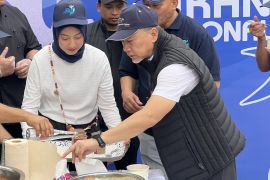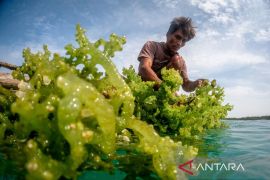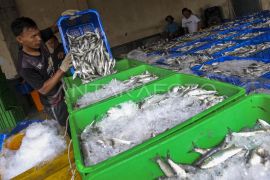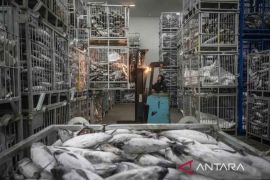The need to tighten control imported fish was voiced by a non-governmental organization (NGO) following allegations that thousands of tons of illegal fish imports had been allowed to enter the domestic market which could threaten local consumers and brought in bad image on the country`s fish products.
"This will create bad image on maritime affairs and fisheries ministry (KKP) in the eyes of the public. It only shows the ministry`s inconsistency and creates bad impacts on the credibility of fisheries at home," Riza Damanik, secretary general of the People`s Coalition for Fishery Justice (Kiara), said.
The NGO has alleged that over 2,000 tons of illegal fish imports had been allowed entry into the domestic market which the government had denied.
According to data from the fish quarantine and aquaculture quality control and safety agency this month, 12,060 tons or 245 containers of illegally imported fish were seized. Of the 2011 total, 2,360 tons were allowed to enter into the domestic market, 4,172 tons or 152 containers were re-exported, and 2,399 tons were re-exported to the countries of origin.
"Even it only accounts for 16 percent, the volumes of illegal fish imports allowed to enter the domestic market will have serious impacts on the domestic fishery industry," Riza Damanik said.
He said that the illegal fish imports must be detained because they had bad quality and contained high metal, water and formaldehyde contents. After all, they were not equipped with the required import documents. The imported fish has the same kinds of fish produced by fisherman in Indonesia.
No matter how much the volumes of fish whose imports are allowed by the government, any imports of fish which involved these reasons must be detained and re-exported because the quality of the fish could not be guaranteed for domestic consumers, according to Riza.
Therefore, Kiara stressed the importance of four points in the handling of fish imports. The government must be consistent with the maritime affairs and fisheries ministry`s Regulation No. 17/2010 on aquaculture quality control and safety which stipulates that the imports must be returned three days at the latest, or be destroyed.
Fish import regulations should also include an import ban on fish which has the same kind of that produced by local fishermen and the government should help reduce fish production cost and provide traditional fishermen with incentives.
"No less important is that the government should provide education for the Indonesian people to consume healthy fish caught by traditional fishermen from the Indonesian waters," Riza said.
Therefore, according to Kiara program coordinator Abdul Halim the government should tighten control of the import of fish whose kind is similar to that produced by Indonesian fishermen and whose quality is bad with excessive water and formaldehyde contents.
He said however that there was no guarantee that illegal fish imports would not circulate in the domestic market.
After all, he has alleged that the maritime affairs and fisheries ministry had been inconsistent in dealing with illegal fish imports as thousands of tons of illegally imported fish were still pouring into the domestic market.
The ministry`s organization management system has caused domestic fish consumers to face quality and safety uncertainty of fish products available in the market, he said.
Letting 2,360 tons to go into the domestic market is a bad precedence for legal enforcement efforts, according to Abdul Halim added.
"The problem is that certain fish suppliers have been accused of receiving and processing fish collected from illegal practices. If we allow it to continue, Indonesia will be seen as illegal fish producer internationally, and of course we don`t want that," he stated.
On the allegation of letting illegal fish imports into the market, the KKP ministry has denied it.
"It is not true if the KKP ministry is accused of having allowed illegal fish imports into the market," Yulistyo Mudho, head of KKP`s Statistics and Information Center said on Tuesday.
He said that the KKP ministry had consistently rejected the entry into Indonesia of illegal fish imports and would re-export any of illegal fish imports.
He said that re-export of illegal fish imports had been done in a number of ports such as Tanjung Periok port in Jakarta and Belawan port in Medan, North Sumatra. The re-export steps were taken as an implementation of the Ministerial Regulation No. 17 / 2010.
The KKP ministry recorded that up to April 5, 2011, it had rejected at least 245 containers and 423 boxes of fishery products imported into Indonesia.
"The allegations that illegal imported fish has been circulating in the domestic market after the KKP has allowed it, are not true," Yulistyo said.(*)
A014/H-NG/O001
Reporter: Andi Abdussalam
Editor: Jafar M Sidik
Copyright © ANTARA 2011











